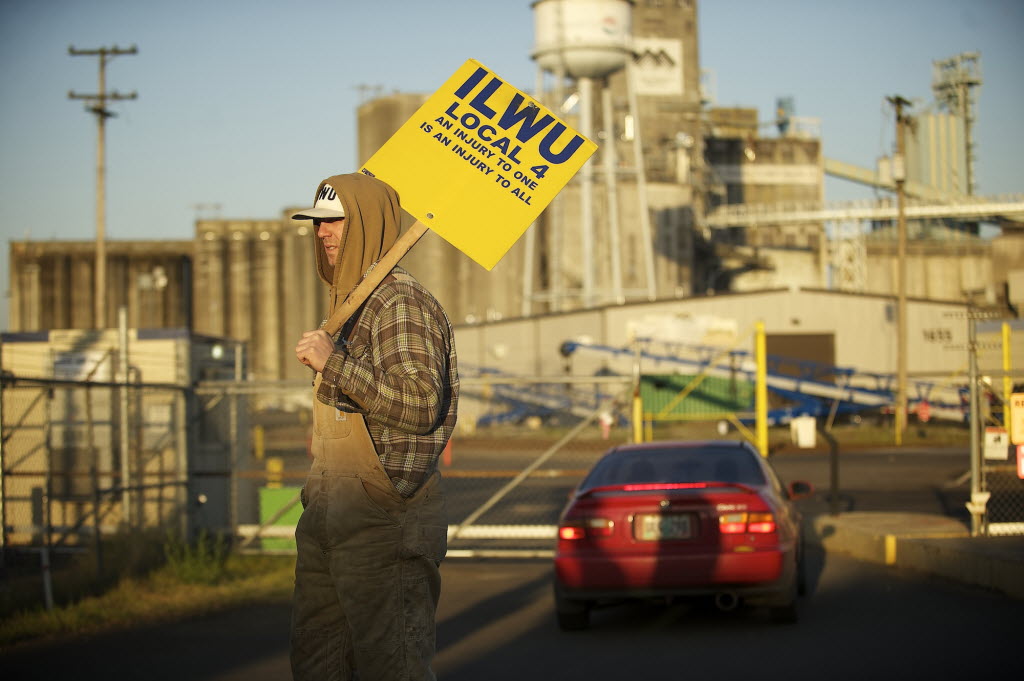A situation that had threatened to foul up the movement of grain at the Port of Vancouver has been resolved, for now, thanks to a closer working relationship between the Washington state Department of Agriculture and Vancouver police.
In the past several days, inspectors with the state Agriculture Department have returned to examining grain shipments at United Grain Corp.’s sprawling plant at the port, a spokesman for the Agriculture Department said Tuesday. Inspectors had recently been unable to reach United Grain because the department said that locked-out longshore workers picketing the entry point — a gate on the port’s east side — had increasingly made inspectors feel unsafe.
Now, agriculture officials will ask Vancouver police to send an officer to the gate to ensure inspectors are able to safely reach United Grain to go to work. So far that’s been working because Vancouver police have “had people available at the times we’ve needed them,” said Hector Castro, communications director for the state Agriculture Department. “We’ve been able to enter and leave essentially without incident,” he added.
As a result, the roughly 3.2 million metric tons of grain — about 16 percent of U.S. wheat exports — that moves in an average year through the port will continue advancing to overseas markets rather than coming to a halt, which had become a concern in the past several weeks.
Vancouver police have done “a really good job of just keeping the peace when our inspectors are entering and leaving the site,” Castro said.
However, the closer working relationship between grain inspectors and the police is a temporary arrangement until a formal agreement can be worked out. Castro said officials are working on protocols that will cover grain inspectors’ access to United Grain, including what to do in case police are unable to send someone.
Vancouver Police Commander Dave King said Tuesday that police are handling the grain inspection calls “like a regular call for service … it is a normal course of business for us, just as if any other business or any other call would occur in the city.”
Yearlong dispute
The restoration of state grain inspections is the latest development in a yearlong contract dispute between Northwest grain-terminal operators and the International Longshore and Warehouse Union. The conflict has included lockouts at United Grain, which froze out 44 union workers in February, and at Columbia Grain in Portland.
The possibility of no or slowed grain inspections arose on Aug. 19. That’s when Don Hover, director of the state Department of Agriculture, said in a letter to relevant parties that state grain inspections would stop unless steps were taken by the first week of September to make it safer for inspectors to cross picket lines.
Castro said state grain inspectors — charged with protecting U.S. and international grain trade and consumer interests — have regularly conducted their work at United Grain, including during the six-month-long lockout of longshore workers.
But as safety increasingly became a problem for inspectors at the Port of Vancouver’s east-side gate, state agriculture officials sought other ways of dealing with the situation. One of those ways was to try to reach United Grain through the port’s main gate, at West 26th Avenue.
Beginning on Aug. 28, inspectors began trying the main gate on a daily basis but were denied entry by the port, according to Castro. At that point, state grain inspections stopped.
However, no major problems had ensued: On Sept. 3, Pat McCormick, spokesman for the Pacific Northwest Grain Handlers Association, which includes United Grain, told The Columbian that “so far no grain shipments have been affected.”
The port denied inspectors access through its main gate and required them instead to use its east-side gate for complicated — but important — legal and operational reasons.
The port established the east-side gate to keep the dispute between the ILWU and United Grain isolated and away from its main gate. It’s where the union may picket and where people who have business with United Grain may access the company. Neither the union nor those who are directly involved in United Grain’s operations — including state grain inspectors — may use the main gate under the port’s rules.
Opening the main gate to the state grain inspectors would have thrown out the rules and would have allowed the union to set up pickets at the main gate. That, in turn, would have prompted longshore members who aren’t employed by United Grain but who operate port facilities under a separate contract to honor the pickets at the main gate by not crossing them to go to work, according to Theresa Wagner, communications manager for the port.
And that would “shut down the entire port,” Wagner told The Columbian last week, “and we can’t do that.”
Nevertheless, the situation has improved under the interim arrangement between state agriculture officials and Vancouver police. Castro said state grain inspectors have been able to reach United Grain, with help from Vancouver police, since Sept. 5. McCormick, the grain handlers spokesman, said in an email to The Columbian that United Grain never had to turn to federal grain inspectors “during the interruption of state inspections.”
State inspectors “have resumed regular shifts at United Grain,” McCormick said.
Aaron Corvin: http://twitter.com/col_econ; http://on.fb.me/AaronCorvin; 360-735-4518; aaron.corvin@columbian.com




